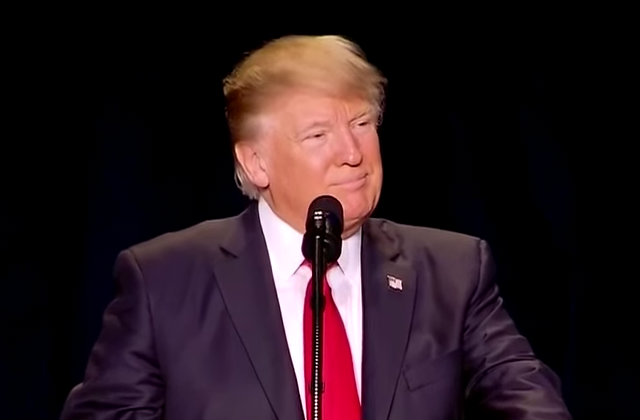
One of President Donald Trump‘s campaign promises to the religious right–the repeal of the Johnson Amendment–may make it to upcoming legislation. Aides say that a tax bill being written in the House of Representative would eliminate the 1954 measure, according to The Washington Post. If so, it will face a mixed welcome from churches and religious experts nationwide.
Named after then-Senator, and future president Lyndon B. Johnson, the Johnson Amendment stops non-profit organizations, including churches, from getting involved in politics. Groups simply can’t dole out campaign contributions. Neither can they provide verbal or written statement, whether in support or opposition of a candidate. Break the rules, and risk losing that precious tax-exempt status. It’s a wall between 501(c)(3) organizations and the way we shape government.
And like most walls, it has doors. There are exceptions, as long as the election-related activity remains non-partisan. The IRS explains:
Certain activities or expenditures may not be prohibited depending on the facts and circumstances. For example, certain voter education activities (including presenting public forums and publishing voter education guides) conducted in a non-partisan manner do not constitute prohibited political campaign activity. In addition, other activities intended to encourage people to participate in the electoral process, such as voter registration and get-out-the-vote drives, would not be prohibited political campaign activity if conducted in a non-partisan manner.
Neutral voter registration drives are A-ok. Voter registration drives on behalf of a candidate, not so much.
President Trump wants to eliminate this measure. He has said so, since June, and continued to oppose the Johnson Amendment in a February speech for the National Prayer Breakfast, saying he’ll “totally destroy” it so religious leaders can speak more freely.
According to the Post, almost 4,500 non-profits wrote congress last week actually asking them to stop the repeal. Another open letter from 99 organizations, including Jewish and Baptist organizations, reportedly asked the same thing. Critics tend to worry about the maintaining an adequate buffer between spiritual matters and more earthly concerns. For example, Dartmouth College professor and religion historian Randall Balmer dismissed concerns that the Johnson Amendment restricts First Amendment rights.
“The Johnson Amendment merely ensures that taxpayers do not subsidize partisan politicking,” he said in a February opinion article. He argues that it simply “ensures that tax-exempt organizations do not serve as the conduit for tax-exempt contributions to political candidates. Kvetching from the religious right is really just an attempt to confuse voters with sleight of hand. Even as they complain about the supposed limitations on their freedom of speech, these leaders fail to acknowledge that tax exemption is a form of public subsidy.”
Jerry Falwell Jr., a leader on the religious right, and president of Liberty University, said such criticism is exaggerated. Reform simply needs to be “carefully crafted,” he told the Post. He means that non-profits would only be allowed to give a small amount to campaigns.
“That just needs to be worked out,” he said. Falwell argued that repealing the Johnson Amendment is about giving religious leaders leeway to talk without worry that they’ll lose tax-exemption status. As he reportedly put it, most aren’t interested in turning churches into super PACs.
We’ve reached out to the White House to learn more about Trump’s take on whether he’d support a bill that eases the measure’s restrictions, but still prohibits tax-exempt organizations from giving money to campaigns.
[Screengrab of Trump at National Prayer Breakfast via Fox 10 Phoenix]